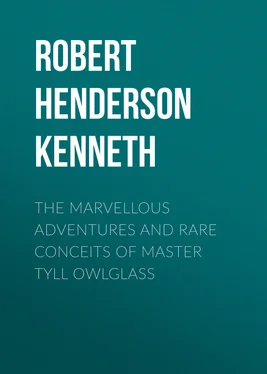Robert Henderson Mackenzie Kenneth - The Marvellous Adventures and Rare Conceits of Master Tyll Owlglass
Здесь есть возможность читать онлайн «Robert Henderson Mackenzie Kenneth - The Marvellous Adventures and Rare Conceits of Master Tyll Owlglass» — ознакомительный отрывок электронной книги совершенно бесплатно, а после прочтения отрывка купить полную версию. В некоторых случаях можно слушать аудио, скачать через торрент в формате fb2 и присутствует краткое содержание. Жанр: foreign_prose, foreign_antique, на английском языке. Описание произведения, (предисловие) а так же отзывы посетителей доступны на портале библиотеки ЛибКат.
- Название:The Marvellous Adventures and Rare Conceits of Master Tyll Owlglass
- Автор:
- Жанр:
- Год:неизвестен
- ISBN:нет данных
- Рейтинг книги:5 / 5. Голосов: 1
-
Избранное:Добавить в избранное
- Отзывы:
-
Ваша оценка:
- 100
- 1
- 2
- 3
- 4
- 5
The Marvellous Adventures and Rare Conceits of Master Tyll Owlglass: краткое содержание, описание и аннотация
Предлагаем к чтению аннотацию, описание, краткое содержание или предисловие (зависит от того, что написал сам автор книги «The Marvellous Adventures and Rare Conceits of Master Tyll Owlglass»). Если вы не нашли необходимую информацию о книге — напишите в комментариях, мы постараемся отыскать её.
The Marvellous Adventures and Rare Conceits of Master Tyll Owlglass — читать онлайн ознакомительный отрывок
Ниже представлен текст книги, разбитый по страницам. Система сохранения места последней прочитанной страницы, позволяет с удобством читать онлайн бесплатно книгу «The Marvellous Adventures and Rare Conceits of Master Tyll Owlglass», без необходимости каждый раз заново искать на чём Вы остановились. Поставьте закладку, и сможете в любой момент перейти на страницу, на которой закончили чтение.
Интервал:
Закладка:
It may be interesting for a moment to set side by side the jester exhibited in the pages of Shakspere and the good Master Owlglass. Historical Owlglass there certainly was at some time of the fourteenth century, his tomb yet standing at Möllen, as will be seen; but the pranks of many excellent jesters were all centred in the book telling of Owlglass; so that he has been overlaid with jokes, not in his own power to perform. Indeed, in the present edition, from a respect I have for chronology, I have been obliged to extrude two or three which would have involved anachronisms. However, they were somewhat dull, and therefore need not be regretted.
The first English version of Owlglass (as to which see the Appendix, p. 220 Конец ознакомительного фрагмента. Текст предоставлен ООО «ЛитРес». Прочитайте эту книгу целиком, купив полную легальную версию на ЛитРес. Безопасно оплатить книгу можно банковской картой Visa, MasterCard, Maestro, со счета мобильного телефона, с платежного терминала, в салоне МТС или Связной, через PayPal, WebMoney, Яндекс.Деньги, QIWI Кошелек, бонусными картами или другим удобным Вам способом.
) having been published early in the sixteenth century, in a “little dumpy quarto,” by Master William Copland, its fame might, without much difficulty, have infiltrated the country parts of England; and, if we regard the clowns of Shakspere, Touchstone, in “As You Like It,” for example, it might appear that Shakspere had seen this Black Letter of William Copland: yet, while the humour of Owlglass consists in his stolid performance of the exact words commanded him, there is clearly a quite other appreciation of wit in the English writer. It is, in fact, the polished foil beside the homely cudgel—both effective weapons, but one of them far more glittering, swift, and murderous. The cudgel may be warded off by a less skilful hand, the glancing steel hath made a wound, and been withdrawn in the very flash of its own rapidity. Dogberry and Verges, Costard perhaps, nay, even Sir Toby Belch, have points of character more resembling Owlglass than do the clowns of our great poet. The Fool in King Lear, has some kin to him, but is infinitely wiser. Indeed, we might perhaps rather class Bardolph, Pistol, and Nym, humourists in their way, with Master Owlglass than the subtle wits Shakspere brings upon the stage. Yet has Owlglass an existence beyond and outside all question of contrast, all opinion of similarity. Gervinus, in his comprehensive History of German Fiction 5 5 History of German Fiction, vol. ii. p. 298.
has well defined Owlglass to be “the personified quip and crank” ( der personificirte Schwank ). In fact, he is a Gothic Diogenes set in a Teutonic frame, living, moving, and having his being in an atmosphere as peculiarly distinct in its grotesque and massive proportions, as was the earlier Hellenic age, in its union of elegance and power. No previous time could have produced such an out-birth, and, with all our modern tendencies towards humour, fostered by the constant study of our quainter dramatists, another Owlglass would be a distortion, if not an impossibility.
That, even in grave England, and with quaint Ben Jonson, Master Owlglass was a favourite, we may see from two allusions which he makes to him; one in the “Poetaster,” Act the Third, Scene the Fourth, where Tucca exclaims: “What, do you laugh, Owlglass?” And again in the “Masque of the Fortunate Isles,” produced in 1626, Ben Jonson introduces Howleglass; and Johphiel says to Merefool:—
Or what do you think
Of Howleglass instead of him?
Merefool. —No him
I have a mind to.
Johphiel. —O, but Ulen-spiegle,
Were such a name—but you shall have your longing.
And later on, the remark is made:—
Whether you would present him with an Hermes
Or with an Howleglass?
Skelton. —An Howleglass
To come to pass
On his father’s ass;
There never was,
By day, nor night,
A finer sight,
With feathers upright
In his horned cap,
And crooked shape,
Much like an ape,
With owl on fist.
And glass at his wrist. 6 6 Jonson’s Works, p. 650.
A most unjustifiable libel, by the way, is committed here, for Owlglass was always a “proper” gentleman, having no crook-back or ape-like appearance. 7 7 An Howleglass is mentioned as being in the library of a Captain Cox. On which, see the Appendix, p. 221 .
One of the most thoughtful and philosophic writers of our day, Mr. Carlyle, has a few noteworthy sentences regarding this strange book, which we shall do well to transfer to these pages:—
“Lastly, in a third class, we find in full play that spirit of broad drollery, of rough saturnine humour, which the Germans claim as a special characteristic; among these, we must not omit to mention the Schiltbürger correspondent to our own Wise Men of Gotham ; still less the far-famed Tyll Eulenspiegel (Tyll Owlglass), whose rogueries and waggeries belong in the fullest sense to this era.
“This last is a true German work; for both the man, Tyll Eulenspiegel, and the book which is his history, were produced there. Nevertheless, Tyll’s fame has gone abroad into all lands; thus, the narrative of his exploits has been published in innumerable editions, even with all manner of learned glosses, and translated into Latin, English, French, Dutch, Polish; nay, in several languages, as in his own, an Eulenspiegelerei and Espiéglerie , or dog’s trick, so named after him, still by consent of lexicographers, keeps his memory alive. We may say, that to few mortals has it been granted to earn such a place in universal history as Tyll; for now, after five centuries, when Wallace’s birth-place is unknown even to the Scots; and the admirable Crichton still more rapidly is grown a shadow; and Edward Longshanks sleeps unregarded save by a few antiquarian English, Tyll’s native village is pointed out with pride to the traveller, and his tombstone, with a sculptured pun on his name,—namely, an Owl and a Glass,—still stands, or pretends to stand, at Möllen, near Lübeck, where, since 1350, his once nimble bones have been at rest. Tyll, in the calling he had chosen, naturally led a wandering life, as place after place became too hot for him; by which means he saw into many things with his own eyes; having been not only over all Westphalia and Saxony, but even in Poland, and as far as Rome. That in his old days, like other great men, he became an autobiographer, and in trustful winter evenings, not on paper, but on air, and to the laughter-lovers of Möllen, composed this work himself, is purely a hypothesis; certain only that it came forth originally in the dialect of this region, namely, the Platt-Deutsch ; and was therefrom translated, probably about a century afterwards, into its present High German, as Lessing conjectures, by one Thomas Murner, who, on other grounds, is not unknown to antiquaries. For the rest, write it who might, the book is here, ‘abounding,’ as a wise critic remarks, ‘in inventive humour, in rough merriment, and broad drollery, not without a keen rugged shrewdness of insight; which properties must have made it irresistibly captivating to the popular sense; and with all its fantastic extravagancies, and roguish crotchets, in many points instructive.’” 8 8 Carlyle, Miscellaneous Essays, Edition 1857, Vol. II. pp. 287–288.
Интервал:
Закладка:
Похожие книги на «The Marvellous Adventures and Rare Conceits of Master Tyll Owlglass»
Представляем Вашему вниманию похожие книги на «The Marvellous Adventures and Rare Conceits of Master Tyll Owlglass» списком для выбора. Мы отобрали схожую по названию и смыслу литературу в надежде предоставить читателям больше вариантов отыскать новые, интересные, ещё непрочитанные произведения.
Обсуждение, отзывы о книге «The Marvellous Adventures and Rare Conceits of Master Tyll Owlglass» и просто собственные мнения читателей. Оставьте ваши комментарии, напишите, что Вы думаете о произведении, его смысле или главных героях. Укажите что конкретно понравилось, а что нет, и почему Вы так считаете.












